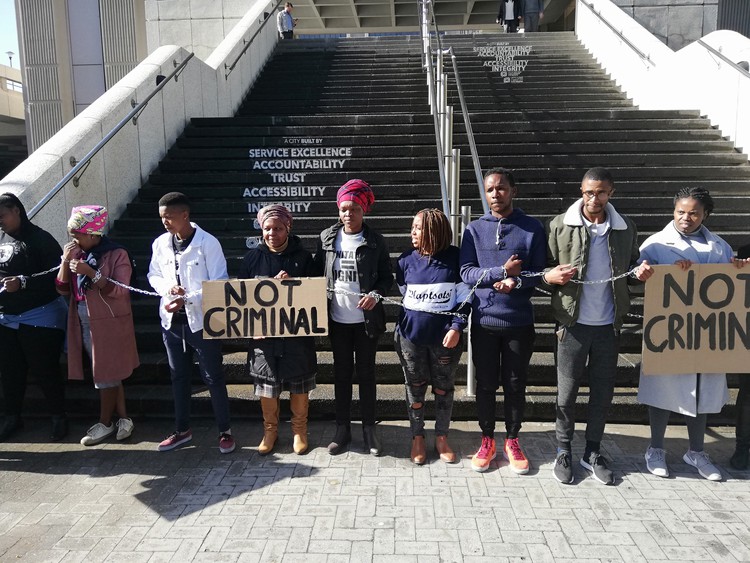
Activists protested against the Regulation of Gatherings Act by chaining themselves to the Cape Town civic centre on Friday. Photo: Thembela Ntongana
17 August 2018
Activists chained themselves to the Cape Town civic centre on Friday. They were expressing solidarity with ten Social Justice Coalition (SJC) members who are possibly going to receive criminal records for having done a similar protest in 2013.
The Constitutional Court will hear what is being called the SJC10 case on Tuesday. The case will decide if the law dealing with protests is constitutional.
In September 2013, 21 members of the SJC were arrested after they chained themselves to the railing of the civic centre in Cape Town in order to get the attention of Mayor Patricia de Lille. They were charged with contravening the Regulation of Gatherings Act, which dates from 1993, before democracy.
According to the act, gatherings with more than 15 people have to submit a notice to protest. The SJC members did not do this.
In February 2015, ten members of the group, identified as the conveners of the protest, were convicted under the act. The remaining 11 were acquitted.
In June 2017 the SJC and the ten convicted protesters brought a case against the Minister of Police at the Western Cape High Court, challenging the law criminalising protest and arguing that sections of the act are unconstitutional. Equal Education, Open Society Justice Initiative and The UN Special Rapporteur were admitted as friends of the court (amicus curiae). Right2Know has also since joined.
In January 2018 Judge Thandazwa Ndita overturned the convictions of the ten protesters. She also declared section 12(1)(a) of the act unconstitutional because it “limits and criminalises peaceful protests” explained the SJC at Friday’s protest.
When a court declares a piece of legislation invalid, the Constitutional Court has to review the decision. This is why the case is being heard next week. But in addition, the Minister of Police has appealed the judgment.
Equal Education and the Right2Know campaign joined the SJC at Friday’s protest. 15 people from the three organisations chained themselves. The reason why they stuck to 15, is that under the current regulations their protest would only become illegal if they were more than 15.
SJC General Secretary Axolile Notywala said that the act had been used to criminalise many protests that were peaceful.
Equal Education general secretary Noncedo Madubedube said her organisation joined as friends of the court on behalf of students across the country. “If there is anything that we do understand about protests, it is that they are typically spontaneous. They typically speak from the heart.” The act criminalised young people who want to use their voices, she said.